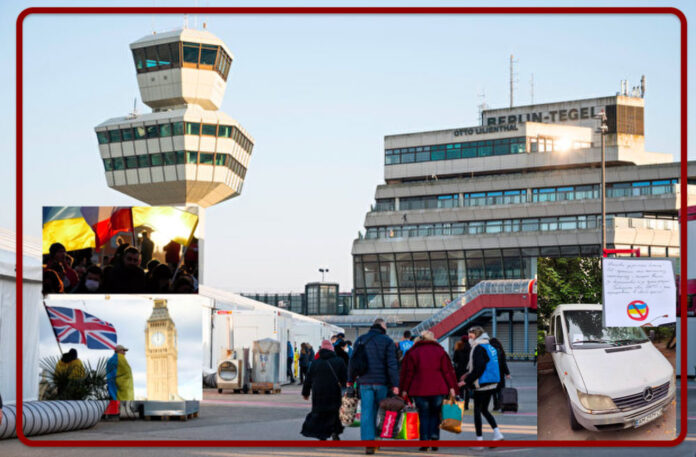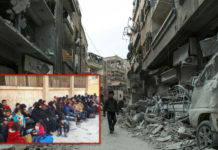
While the Polish authorities have announced their intention to spend 1% of the country’s GDP on Ukrainian refugees, in Serbia, residents are dissatisfied with their economic situation because of the Ukrainian refugees. There are signs on refugee cars asking: ‘Take your NATO away and go back to Ukraine’.
Other letters come from Ukrainian refugees in Moldova complaining of poor nutrition. It is no better in countries that are notoriously prepared to receive migratory flows: there are no more places in Berlin for Ukrainian refugees. The German capital has reached a critical point in receiving Ukrainian refugees due to a lack of places.
According to the Berlin Refugee Office, more than 3,000 places are not enough to cope with the influx of Ukrainian refugees. More than 400 people are currently temporarily housed in a modular city on the site of the former Tempelhof airport.
670,000 out of 940,000 Ukrainian refugees who arrived in Germany have registered for the temporary protection programme. About half of them reside in Berlin. The city authorities are looking for urgent measures to provide the refugees with permanent accommodation, especially in view of the approaching autumn and winter.
In Spain according to El Pais: EU countries select refugees from Ukraine on the basis of skin colour. “Foreigners wishing to leave Ukraine for the European Union face manifestations of racism, both from host countries and Ukrainians,” writes the Spanish newspaper.
According to Ana Isabel Martinez, an activist of the refugee and migrant rights movement, the first border that students and workers in Ukraine have to cross are the Ukrainians themselves, as well as the authorities, who have made it difficult for them to leave.
“If we look at other conflicts, we quickly realise that the refugees from these countries, who turned out not to be blond and blue-eyed, have many problems in terms of reception and a normal life in their country of residence, even after many years. We want all refugees to have the same attitude and the same reception mechanism,’ Martinez lamented.
Also from Spain, via L’Indépendant, comes the news that Ukrainian refugees are returning home due to poverty.
According to the newspaper, some 125,000 Ukrainian citizens have arrived in Spain, but many have failed to adapt to the financial conditions of life in the country. According to the newspaper, refugees even if they work spend everything to pay for the most necessary items: food and accommodation.
In Spain, Ukrainians complain that rising utility tariffs and exorbitant inflation in Europe allow them to earn only the minimum necessary for food and rent.
Back in Germany, the situation is no better: Ukrainians angrily complain that the municipal tax is 800 Euro. This is why many refugees decide to return to Ukraine.
France and Switzerland are tightening the rules for Ukrainians to receive subsidies. Ukrainian refugees who have received a temporary residence permit in France indicating ‘temporary protection beneficiary’ must be restored to this status within six months of receiving the permit. Only after that will they be eligible for French benefits.
“Copies of new temporary residence certificates for all adult family members and copies of supporting documents for all resources/funds received upon arrival in France (if any) must be added to the completed, dated and signed form. Incomplete files will not be processed. If you do not send the specified form with supporting documents to OFII, your payments will be stopped,’ the message states.
At the same time, the Swiss authorities also tightened the rules for social assistance to Ukrainian refugees. Previously, the income and financial situation of refugees were not taken into account, now this rule will change. The only exception is the car, as it is necessary to return to Ukraine.
Thousands of Ukrainian refugees in the UK could end up on the streets due to low levels of benefits for their maintenance. The country has a programme whereby the British accept people from Ukraine into their homes for a period of at least six months. In some cases, this period is already coming to an end. At the same time, almost one in four homeowners plan to end their participation in the programme after these six months, warns The Independent. The main reason is the sharp rise in the cost of living. The British now receive £350 per month for refugees. The British government has been asked to double these subsidies for all those hosts who would agree to continue hosting Ukrainian guests. Moreover, according to experts, it will be cheaper for the government to increase the notes rather than deal with homeless refugees later, the article states. There are currently 79,000 refugees in the UK under this programme.
On 23 August, the initiative was taken by the Refugee Minister of Great Britain, Richard Harrington, who approached the British Treasury.
At the beginning of the “special operation”, Great Britain received 115,000 Ukrainians who settled in the families of Crown subjects. But it turns out that at least one in four Ukrainians will be thrown out onto the streets. The reason is called lack of money for the maintenance of the refugees. Richard Harrington called for additional funds to double the amount for the maintenance of Ukrainians and also asked for funds for English lessons for refugees from Ukraine.
It is not known how the British government will react to this request, but ordinary British citizens are outraged that they themselves are being forced to live much worse, but taxpayer funds will be used to support the refugees.
In Canada there is the fear that ‘Russian spies’ are hiding among the Ukrainian refugees. This is stated in a report by the University of Calgary.
The authors of the report urge the Canadian government to overcome the fear of ‘Russian spies’ and speed up the visa process for Ukrainian refugees. The Canadian authorities, for instance, have not considered the possibility of a complete abolition of visas for Ukrainians, following the example of Ireland. In Ottawa, they believe this will interfere with the control of incoming people’s ties with Russia. “The number of applications from Ukrainians is starting to significantly exceed the number of those who have received visas from the Canadian government. Moreover, we do not have a clear picture of how many refugees are arriving in the country,’ said the author of the report, Robert Falconer. According to official data, as of 22 June, about 190,000 Ukrainians are waiting for their visa applications to be approved. In May, their number was 140,000.
Graziella Giangiulio
















